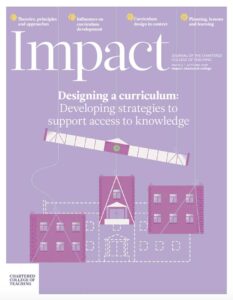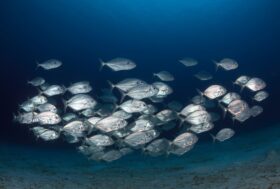Building an innovative, Socratic curriculum for content-heavy subjects

In most biology departments, a spiral curriculum can be seen in schemes of work (SOW) and in the point order of exam board specifications. For good reason. A subject in which key concepts underpin more complex ideas, such as knowledge of protein structure and function being essential to understanding the selectively permeable nature of cell membranes, requires the teaching sequence to be carefully planned. There should be opportunities to revisit key concepts in different contexts. Typically, biology curricula are well structured: the teaching sequence promotes learning. The potential danger for content-heavy subjects, however, is that pressure to cover the course restricts the development of analytical tools and curtails chances to discuss connections and implications.
In the Philosophy for Children approach (inspired by the Socratic method), it is common to enquire, even with young children, about a question such as ‘What is friendship?’. This works because virtually all children have significant experience in this domain. The question here is: how appropriate is the Socratic method in a GCSE biology class? Given the positive A-level feedback we’ve had, this article will consider how to optimise our Socratic teaching at GCSE so that seminar lessons reinforce and extend the core curriculum knowledge.
It is often debated by teachers when students should move from acquiring new knowledge (grammar) and engage in critical thinking and dialogue (dialectic). Also: when do they know enough to present on a particular topic (rhetoric)? There’s a concern that students of content-rich subjects might suffer a narrowing of perspective as a result of coverage being prioritised over critical interrogation of knowledge. We can’t make good critical judgements without a secure knowledge base, yet our knowledge base is potentially insecure unless we have applied our critical faculties to the information we’re learning.
Having examined the use of Socratic methods at A-level in seminar classes, we are now considering how to design a Key Stage 4 curriculum that also includes this strategy to enhance knowledge acquisition and develop a core set of skills in science, such as oracy, scientific literacy and critical thinking, all of which are approaches that complement the development of the skill of applying known scientific knowledge to novel and more complex situations, which is increasingly pertinent in reformed GCSE and A-level qualifications.
Socratic approaches and scientific literacy
The philosopher Socrates would question people who were experts in their fields, from shoemakers to soldiers. As a path to critical self-awareness, these conversations could attain insights into things like the nature of beauty or courage. But Plato’s contribution was then to point to the gap in Socratic thinking, namely that there isn’t a definitive answer: questions beget more questions.
So if a teacher is to encourage dialectic in the future, they must never lose sight of the core knowledge that students will need to become experts. The importance of dialectic is that it can improve understanding, and possibly create new understandings and/or deeper understandings. For example: ethics-based discussions of stem cell research can introduce ideas from philosophy or religious studies; and we can realise, through studying coeliac disease, the necessity of high surface area (villi) for gut absorption, rather than merely seeing that characteristic as ‘optimal’. We ‘stand on the shoulders of giants’, so teaching students about the dialectic that led us to current theories is both interesting from a knowledge point of view (history of science) and beneficial in terms of encouraging Socratic skills.
This approach should only be used to accentuate the building of effective frameworks of understanding. The concepts and knowledge are fundamental. We don’t want memorised factoids to be glibly deployed in a debate setting, but rather a deep understanding of concepts informing critical engagement with issues such as climate change and medical ethics. Socratic approaches are not always appropriate. For example, while the key function of lysosomes could be taught through learning about lysosomal storage disorders, this would be an inefficient approach due to the complexities of the condition. It would be better to explicitly teach their function first and then elaborate on the multiple roles and interactions of lysosomes in the cell at a later point.
Oracy is a related skill often neglected in the sciences at school. Whether our students pursue careers in science or work in other collaborative settings, oracy is important. In a post discussing the importance of oracy for the development of communication skills, the authors highlight its importance for ‘employment and democratic engagement, but also for encouraging students to become critical thinkers’ (Mercer et al., 2014)(Robinson, 2013).
Designing a curriculum to include, where appropriate, deliberate emphasis on scientific literacy and dialectical skills should allow students to understand the genuine academic nature of a subject like biology. Often, this is not accurately represented at school level.
From A-level to GCSE
Our previous head of biology introduced seminar lessons for Year 12 several years ago. Each half term, a theme is chosen and students write one essay on a topic related to the theme – these tend to be linked to specification points, but move well beyond the confines of these, e.g. examining altruism in animals through an evolutionary lens. Past themes have included evolution, medical sciences and the scientific method. These lessons rarely require a pen. Students work in small groups with clearly defined tasks, which are mostly discursive. There is often some set reading preceding discussion. Teachers facilitate. A brief outline of a seminar lesson used in Year 12 can be seen in Table 1.
Table 1: An outline of a seminar lesson on ‘evolution’. This lesson focuses on recent and future human evolution.
| Learners will… | Teacher will… | |
| Part 1 | Following previous lesson in which New Scientist article was used to discuss common misconceptions in evolution, students read a short explanation of evolution and identify the misconceptions in the account.
Share thoughts as a group. Discuss as a class/larger group. |
Explain task – and facilitate the discussions at class/larger group level to ensure that each group has identified all misconceptions. Do so by asking questions rather than answering them. |
| Part 2 | Debate statement posed: ‘This house believes human evolution has ceased’ or ‘Human evolution has now ceased’.
Debate can be run according to class/group size and teacher preference for style/format. |
Explain task and facilitate by asking students to identify key questions (such as how we define ‘selective pressure’ in their preparation time). |
| Part 3 | Two articles arguing each side of the debate are read by students – they work in pairs to decide a) which is more convincing and why; b) what their personal view is (justify this); and c) whether evaluation of the scientific evidence has altered their view. | Highlight the importance of flexibility when presented with new information in science. Model how to evaluate the evidence, and thus come to a well-informed and balanced view. |
When teaching evolution as part of the A-level course in Year 13, the students who had discussed evolution in the seminar lessons the year before were more knowledgeable and more adept at evaluating data. When learning about the topic for their A-level exams, they knew more than the students in years prior to the seminar lessons. They had not been ‘taught’ about the topic in a traditional sense in the seminar lessons: all the learning had occurred through discussion and was guided by the teacher. It was clear that they had acquired knowledge through their own discussions, informed by the reading. They were able to identify and pick apart misconceptions for themselves with only minimal prompting from their teachers. Furthermore, they were significantly more confident in discussing the nuance of sexual selection as a mode of natural selection due to their deeper understanding of the process established in the seminars. Evolution is a topic that lends itself to developing scientific reasoning, as highlighted in Margaret Evans’ work with museum visitors (Evans, 2018). The question we are now considering is how to optimise our teaching of these skills at GCSE, given the positive A-level feedback.
Students report favourably on the experience of learning in this way – for example:
The impact of these lessons on attainment has not been formally measured, as this was not the aim of their introduction. However, our discussions within the department lead us to believe that pupils are more prepared for competitive university interviews, and the quality of their essay writing has undoubtedly improved. Further to this, students are more confident in class discussions during Year 13.
As with the Key Stage 5 seminars, the intention in introducing comparable lessons to our Key Stage 4 curriculum is to enrich the curriculum and address a perceived deficit in skills development, rather than to determine a quantitative impact linked to public exam results. However, in this case we plan to more formally measure progress using a qualitative questionnaire to determine students’ perceptions of their scientific literacy and critical thinking skills.
The perception among Singaporean students in PISAThe Programme for International Student Assessment, a worldw... More data is that they rely less on memorisation in maths than is reported by UK students. Lucy Crehan’s analysis is that this may be attributable to the earlier prioritisation of factual knowledge in Singapore compared to the UK (Barton and Crehan, 2018). This then opens up scope for more dialectical, open-ended learning later on. The importance of embedding the knowledge needed for the next stage of education was eloquently discussed in Adam Boxer’s article on designing a new Key Stage 3 science SOW (Boxer, 2018). Using insights from cognitive scienceThe study of the human mind, such as the processes of though... More to promote fluency in key concepts is essential, and the earlier the better. Just as developing wider scientific skills at Key Stage 4 should allow a smoother transition to Key Stage 5, the grounding of grammar in Key Stage 3 should free up some time in Key Stage 4 for this dialectic, and is also worth considering when a Key Stage 4 curriculum is being designed.
Conclusion
In terms of pedagogy, Tom Sherrington’s ‘Mode A’ (broadly, knowledge acquisition) and ‘Mode B’ (broadly, knowledge application) delineation offers a useful model to appraise the time dedicated to critical reasoning skills within a given curriculum (Sherrington, 2018). Ultimately, all the strands of critical and evaluative engagement with scientific concepts rely on a good knowledge base, and whether the time dedicated to ‘Mode B’ learning is 10%, 20% or 30%, the critical factor remains planning this time carefully and deliberately, and in making sure that across science, the more content-heavy biological sciences do not lose out on this skill development due to dealing with a high knowledge-acquirement rate.
Our plan for the forthcoming year is to introduce dedicated seminar lessons to our GCSE curriculum – fewer than for A-level, but with the same aims and intentions. Whether the impact will be anecdotally, or measurably, successful remains to be seen, but the planning of these lessons is already reopening our eyes to the potential of teaching considerable curriculum content in a creative and inclusive manner – giving the students, to borrow Sherrington’s metaphor, a more varied diet.
Final note
If any biology teachers would like to try using these GCSE seminar lessons, a lesson plan and associated resources for a series of 10 lessons are available by contacting Jane Evans on jane.evans@westminster.org.uk










